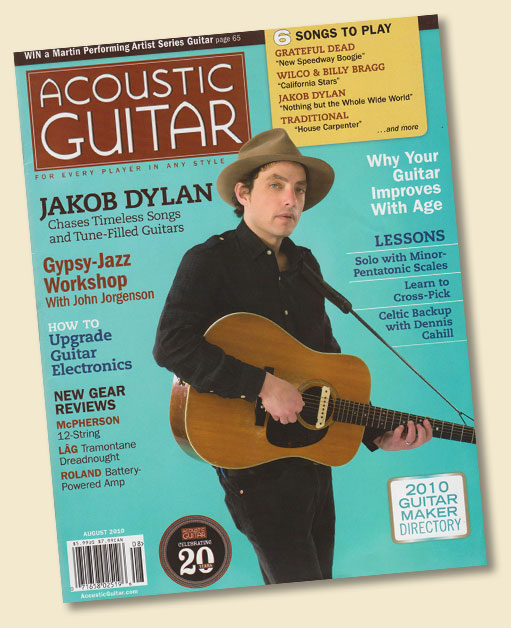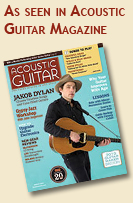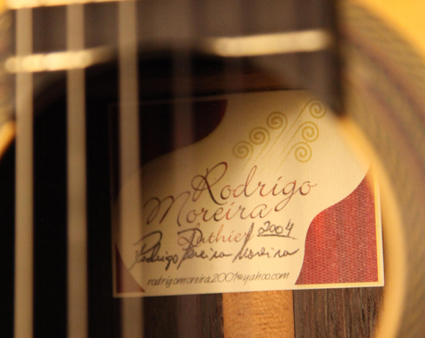Archive for July, 2010
AAL in Acoustic Guitar Magazine
 AAL was mentioned in a sidebar to a great article about guitar aging by Robert Johnston in the August issue of Acoustic Guitar Magazine.
AAL was mentioned in a sidebar to a great article about guitar aging by Robert Johnston in the August issue of Acoustic Guitar Magazine.
We bring this up not so much as a promotional vehicle for us (don’t get me wrong, we’d work it if we could find a way, but it was only a name drop, not a cover story!) as much as to point out a well-structured bit of journalism about a topic near and dear to our hearts here. The article discusses the properties of aging that directly contribute to the changing of an acoustic guitar’s sound.
A quote from the article:
“There is no question that stringed instruments change as they’re aging and are getting played. On some instruments, the changes people detect are dramatic, while on others they’re more subtle, making it difficult to predict the sound a new guitar will deliver in the future. For these reasons, it’s best to not count on specific tonal improvements when purchasing a new guitar, but rather to choose one that sounds great to you now; think of anything else as icing on the cake!”
Which is a seemingly obvious yet, surprisingly crucial statement that we firmly support. What we’ve said about our process from the beginning, that it’s YOUR guitar, only moreso – is still behind everything we do. We wouldn’t have the level of customer satisfaction that we do now (100% by the way) if we made people’s guitars sound like other guitars. You picked your guitar out with emotion and great care. What we do is to take your guitar to ITS fullest potential. Not make it sound like something it wasn’t meant to be, but rather exactly what it WAS designed to be, someday in the future.
We’re happy just being mentioned in the article, even if it is in the same breath as a couple device-based gizmos that throw a wacky one-size-fits-all, “Flowbee” shroud over the science of what we do. (It’s okay, we understand. $149 is hard to pass up. We’re not saying they don’t work, in um – their own way. Talk to us about it sometime.)
One thing the article talks about that we wish we had the chance to respond to formally is this notion that even in the best lab testing they’ve devised, these are super-subtle effects that human auditory memory can’t even discern between because ear memory dissipates so quickly – yadda, yadda. Um, respectfully – no. Maybe if you’re trying to compare two “same” guitars (note – the author does allow that no two guitars are ever truly the same, but they still used the reports from the test) or sticking an aquariam vibrator on your guitar for a 100 hours, or just asking unassociated players which guitar tone they like better – you’ll get some varying results that could be attributed to the poor human ear memory. But we haven’t had one customer yet report back anything less than dramatic transformation in volume, balance, sustain etc. from our process. In fact, it’s been blogged about independently out in the world. More importantly, we’ve captured and graphed those unsubtle differences with our data measuring equipment. let me go further and add what we’ve said all along – if any notable publication (like AGM, for example) wants AAL to put our money where our mouths are – we’ll process a guitar for free for their scrutiny, or take part in a test or shootout.
Let’s talk.
Rodgrigo Moreira Hauser Replica
Frank brings the freshly AO1-optimized Rodrigo Moreira Hauser replica classical guitar back to Porsche specialist John Raysich, at his repair shop (John Raysich Porsche Specialties) in Pittsburgh, PA.
This guitar has an interesting story. Moreira was commissioned to do some restoration work on Segovia’s 1931 Hauser I guitar. Having one, if not THE most prized classical guitars in the world in hand, Moreira decided to build a replica or two….
It’s February, which was pretty brutal this year in Pittsburgh, and John was busy at work, in coveralls, with beepers and phones ringing and mechanics asking him questions while he tried the guitar for the first time after being processed. So – as usual, we present a very candid, un-glamorous look at REAL customers’ REAL reactions when they get their instruments back.



